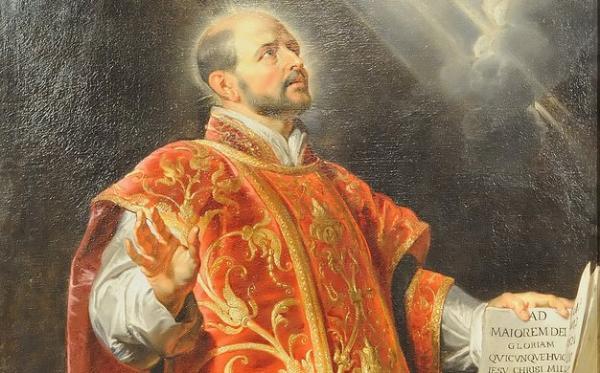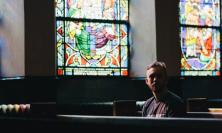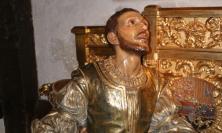This week, the Anglican Centre in Rome has hosted a course on what might be considered a surprising topic in that setting: the spirituality of St Ignatius. In an interview for Vatican Radio, Philippa Hitchen asked the two men behind this course, Rev David Richardson and Fr Gerry Whelan SJ, about how they were hoping to enrich the spiritual lives of the participants by giving them an introduction to the Spiritual Exercises and the work of the Jesuits.
The Spiritual Exercises of St Ignatius helped to shape the
life and mission of the first members of the Society of Jesus, founded in 1540,
and have transformed the lives of those who have practised them ever since.
Ignatian spirituality focuses on God?s presence in our world and his active
participation in our lives.? For regular
practitioners, it?s a pathway to deeper prayer, to better decision-making,
guided by keen discernment and an active life of service to others.
In a nutshell, that?s why the Anglican Centre in Rome decided
to host a weeklong course in Ignatian spirituality, with a focus on the
ecumenical dimension of the Jesuits? work and mission, especially in the years
since the Second Vatican Council. The organisers hope to show something of the
way in which Jesuit spirituality has permeated Church history, theology,
education, communication, and even the art and architecture of the Eternal
City.? The two men behind this rather
unusual initiative are Rev David Richardson, Director of the Anglican Centre,
and Irish Jesuit Fr Gerry Whelan from Rome?s Gregorian University. Vatican
Radio?s Philippa Hitchen met the two directors to find out more about the aims
and the focus of this course, which runs from 12-16 October.
Ignatian spirituality seems a strange subject for an Anglican centre to be running a course on. What’s the idea behind this course?
Rev David Richardson: The Anglican Centre has, in the past, run courses on different approaches to spirituality and prayer. There are of course Anglican Franciscans and so to run a programme on Franciscan spirituality was very obvious, and we’ve done that twice. We’ve also run courses on Benedictine spirituality twice. I arrived here last year and thought that, although there are no Anglican Jesuits, nevertheless there are many Anglicans who have been helped deeply in their spiritual journey by the Spiritual Exercises of St Ignatius. So there was that principle, and secondly, over the years the most open and supportive group, in terms of ecumenism, that I’ve encountered in the Roman Catholic Church has been the Jesuits, and so I thought that to do a course on Ignatian spirituality that allowed Anglicans, and anybody else of course, to dip their toes in the water, might be an exciting thing to do.
Fr Gerry, you’re organising this course. You talk about it more as a process rather than just a series of lectures. Tell us about how it’s going to work.
Fr Gerry Whelan: I feel I should say that my response when I was asked to help with this course was mixed. I’ve worked in Africa for quite a long time, very much with Anglicans actually and in ecumenism in general, so I was delighted to have contact with the Anglican Centre. On the other hand, I was chary of trying to teach intellectually, so to speak, about Ignatian spirituality. For example, when we enter the noviceship as Jesuits, we’re not told much about Ignatian spirituality as such, we’re just sort of launched into this very challenging experience of the 30-day retreat. The book of the Spiritual Exercises, written by St Ignatius, is really a manual for our director and we’re not invited to read it. It’s a mainly silent process, but we’re actually talking to the director every day – he has tools from the book to help him recognise what’s going on for us and to guide us through an experience of an encounter with God. We talk, for example, of the grace of the first week, the grace of the second week, of the third week and the fourth week. So in some ways, I think, there’s a danger of doing more harm than good by teaching ideas about the Spiritual Exercises.
What we’re emphasising in many ways is probably Jesuit history and how Ignatian spirituality has informed different ministries of the Jesuits, above all the early Jesuits and then Jesuits now, post-Vatican II. But at the same time, although it’s not so noticeable in the schedule perhaps, we have one hour of prayerful reflection at the end of each day where we will try to do a very Ignatian reflection on our experience of that day; I’ll offer a little bit of help with the tools of trying to discern the spirits of that day, as Ignatius would have put it, the lights and shadows. In my experience something really accumulates there; there’s a trust that emerges in the group, and the ability to recognise the remarkable thing that God works through our feelings, through our desires, and if we just become a little bit more alert to that, it’s enormously important, for example, in helping us make decisions for our lives.
And yet you talk about a paradox within this Ignatian spirituality. What exactly do you mean by that?
GW: Well, you don’t want to teach too much about Ignatian spirituality, you want people to experience it, so we’re kind of filling in the course content with lectures and visits around Rome; and then in a certain sense the real point, from the Ignatian spirituality point of view, is this reflection that happens in the evening, and then we have a full day of reflection on the last day. That’s the paradox: it’s a course with content, but in some ways it’s the process of reflection on the course that’s even more important.
As you say, you’re going to be travelling around Rome looking at the historical sites where the Society of Jesus really all began, aren’t you David?
DR: That’s right. We start off on the first morning going to St Ignatius’s rooms and diving into that experience of history.
Who is this course primarily aimed at? Is it people with experience of the Jesuits themselves? Is it people particularly working within an ecumenical context?
DR: Fr Gerry was saying before that he likes the fact that the Anglican Centre has this simple mission statement that we are trying to foster friendly and informed relationships between our two churches. I guess most of our courses are aimed at Anglicans who want to come to Rome and learn about how, in this case, Jesuit spirituality in Rome may inform their understanding of the Roman Catholic Church, and indeed their understanding of their own spirituality and of what it means to be an Anglican today. We actually have at least one Roman Catholic person coming from the United States; we have a couple of Anglicans from England; we have a Brazilian bishop and his wife, so it’s a mixture. It’s targeted at anyone who wants to have this paradoxical experience.
It’s also particularly relevant, though, isn’t it? This question of spiritual ecumenism is very much the direction in which the Catholic Church in particular is looking, given the current practical difficulties between the two communions.
DR: Absolutely. The notion of ecumenism that is done by hospitality and prayer and spirituality is a really key initiative, I think. The reality is that over the last forty-something years, since the Second Vatican Council, there have been lots of ticks given to things we can actually affirm together, but every time we affirm something we find something that is harder to affirm; or we find that when we can say one thing together, it just opens up a new set of things that we can’t quite say together! But the spiritual life is something that belongs to the whole tradition.
Fr Gerry, you were talking earlier about your experience in Africa. Just give us a little insight, if you can, into how this particularly Ignatian spirituality was so useful to you within an Anglican or ecumenical context there in Kenya.
GW: Thank you. I was eager to talk about that actually, just as David was talking about spiritual ecumenism. I was in Africa for fourteen years, but for my last six years I was pastor in a parish in a poor area of Nairobi. You may know that in a lot of Africa, there’s an option by the bishops to base parish life on small neighbourhood groups called small Christian communities, which meet in addition to Sunday Mass, pray with the scripture but reflect about action in their neighbourhood as well – a kind of ‘see; judge; act’ process. Now I came in and there were some hiccups in how this was proceeding in the parish, and the pastoral council were fairly clear to me that they hadn’t had enough spiritual formation before moving into this reflection on the situation. So we introduced a sort of simplified process of Ignatian spirituality, connected to Bible study, that had some very rich results. But I can say that I went through a kind of ecumenical conversion in the process as well. First of all it was just a wonderful thing to see a spiritual deepening in this parish, and then this was helping all the other action things that they wanted to do as small Christian communities and as parish. But it’s like we had an insight together that if you’re growing in holiness, if we dare say that, the scandal of living beside fellow Christians, who are also praying with the scriptures and who are growing in holiness, and being disunited is just very obvious, so we started having a lot to do with as many of the other churches as we could. We only succeeded mostly with Anglicans I have to say, and also Methodists; much less with Pentecostalists or African Initiated Churches, it was more remote there. To paraphrase Pope John Paul II in Ut Unum Sint: if you’re growing in holiness, you cannot but feel moved to ecumenism, and that was a reality for us. Some of the other protestant churches had parallel structures to our small Christian communities so we would have, once a year maybe only, but joint scripture prayer weeks and then a big prayer for Christian Unity together, so ecumenism was a very central part of what we did in that parish.
Coming back to the course, you’ve got some very interesting sessions on, for example, art and architecture, or communications and the modern day Jesuit spirituality. Tell us a bit more about the variety that will be on offer.
GW: Well, it’s exciting – there’s the physical walking around and seeing the buildings. There is the question of art, which is fascinating: the Baroque era is very obvious in Rome with these very ornate churches, and the Jesuits were very involved with that movement in art, the Counter Reformation. In French I believe the Baroque is often called le style jesuite. So that comes into it, and we’ll be trying to talk about art and visit some churches, again remembering that Ignatian spirituality was informing this approach. Ignatian spirituality is very much confident about God in the world and in our feelings and in our response to beauty, for example. Everything truly human is truly of God and worth emphasising, so on the art front that’ll be the point we’re making. On communications, we’ll visit Vatican Radio: it is fascinating really, the impulse to spread the word and the ability to use different means that always characterised Jesuits. Another visit we’ll be making, maybe it’s more of a lecture than anything else, is to where I teach, the Gregorian University, which really captures something of the Jesuits and education. A professor of history there will be talking about the history of the Gregorian Institution and how the Jesuits have changed through the years.
And the figure of St Ignatius himself – how much will he really be the focal point of this course?
GW: That’s a very interesting question. Perhaps I will say: not much. This is maybe just a personal opinion, but there’s something a bit unusual about us Jesuits, you might say. Our relationship to St Ignatius, as compared maybe with Franciscans to Francis or Benedictines to Benedict, lies in that the real gift of Ignatius to us was the instrument of the Spiritual Exercises; we feel like good Jesuits, so to speak, by discerning the spirits, by functioning from a structure that is very much part of us now – the Spiritual Exercises. So personal devotion to St Ignatius himself, I think, often figures less for Jesuits than for other founders of congregations. So we will be visiting his rooms, we’ll be talking about his life quite a bit, but we’ll be moving along to Vatican II, to Pedro Arrupe as arguably a second founder of the Jesuits, and to the ability to reinterpret what Jesuits do as times change, based again on the discernment of the Spiritual Exercises.
This article is an edited transcript of an interview broadcast on Vatican Radio on 8 October 2009. To listen to the interview, please click on the links below, or at the top of the article.
![]() Listen to the interview – MP3 file
Listen to the interview – MP3 file![]() Listen to the interview – RealAudio file
Listen to the interview – RealAudio file![]() Vatican Radio
Vatican Radio![]() Anglican Centre
Anglican Centre






